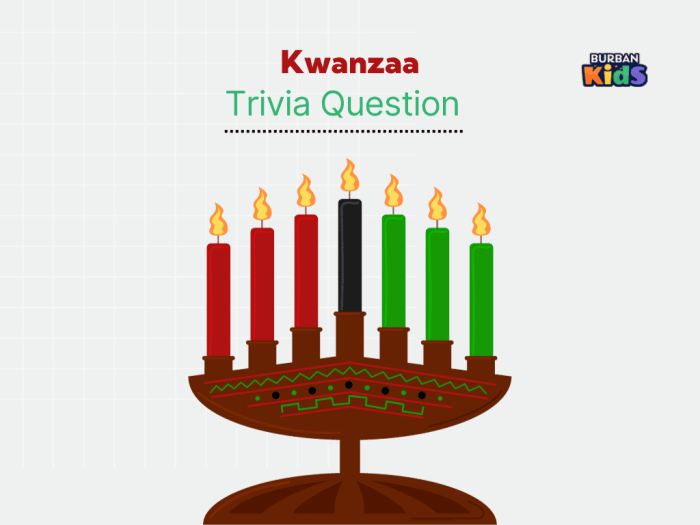Kwanzaa trivia questions with answers – Embark on an enlightening journey with our comprehensive Kwanzaa trivia questions and answers. This exploration unveils the cultural significance, historical roots, and cherished traditions of this vibrant celebration, enriching our understanding of African American heritage and identity.
Kwanzaa, a seven-day festival observed from December 26th to January 1st, embodies the Nguzo Saba, or seven principles, that guide its observance: unity, self-determination, collective work and responsibility, cooperative economics, purpose, creativity, and faith.
Introduction

Kwanzaa is a weeklong cultural celebration observed by many African Americans in the United States and the African diaspora. It was created by Maulana Karenga, a professor of African studies at California State University, Long Beach, in 1966 as a way to connect African Americans with their African heritage and to promote unity and self-reliance.The
holiday is celebrated from December 26 to January 1 and is based on the traditional African harvest festivals. Each day of Kwanzaa is dedicated to a different principle, or Nguzo Saba: Umoja (unity), Kujichagulia (self-determination), Ujima (collective work and responsibility), Ujamaa (cooperative economics), Nia (purpose), Kuumba (creativity), and Imani (faith).
Significance
Kwanzaa is a significant cultural celebration for African Americans as it provides an opportunity to connect with their African heritage and to celebrate their culture and traditions. The holiday also promotes unity and self-reliance, and encourages African Americans to work together to improve their communities.
Kwanzaa Principles and Symbols

Kwanzaa, a weeklong celebration observed from December 26 to January 1, is rooted in African heritage and cultural values. It was created by Dr. Maulana Karenga in 1966 as a way to honor African traditions and principles.
At the heart of Kwanzaa lie the Nguzo Saba, seven principles that guide the celebration and embody the values of the African Diaspora. These principles are:
- Umoja (Unity):Striving for and maintaining unity within the family, community, nation, and race.
- Kujichagulia (Self-Determination):Defining oneself, name, and image in a way that reflects one’s own values and aspirations.
- Ujima (Collective Work and Responsibility):Working together to build and maintain the community.
- Ujamaa (Cooperative Economics):Supporting businesses and economic initiatives within the community.
- Nia (Purpose):Developing and fulfilling one’s purpose in life.
- Kuumba (Creativity):Using one’s creativity to improve oneself, the community, and the world.
- Imani (Faith):Believing in oneself, one’s people, and the principles of Kwanzaa.
These principles are represented in various Kwanzaa symbols, including the kinara, candles, and other traditional elements.
Kinara, Kwanzaa trivia questions with answers
The kinara is a seven-branched candleholder that represents the seven principles of Kwanzaa. It is traditionally made of wood or metal and is often decorated with African symbols and motifs.
Candles
The seven candles used in Kwanzaa are divided into three groups: three red candles, three green candles, and one black candle. The red candles represent the struggle and blood shed by African ancestors, the green candles represent the land and hope for the future, and the black candle represents the African people.
Other Traditional Elements
Other traditional elements used in Kwanzaa include:
- Mkeka (Mat):A straw mat that represents the foundation of the African home and community.
- Vibunzi (Corn):A symbol of the harvest and the abundance of the African continent.
- Kikombe cha Umoja (Unity Cup):A cup used to drink from during the Kwanzaa celebration, representing unity and togetherness.
- Zawadi (Gifts):Gifts given to children during Kwanzaa, representing the importance of education and self-improvement.
These symbols and principles combine to create a rich and meaningful celebration that honors African heritage and promotes unity, self-determination, and community.
Trivia Questions and Answers: Kwanzaa Trivia Questions With Answers
Test your knowledge of Kwanzaa with these trivia questions and answers.
Kwanzaa is a weeklong celebration that honors African heritage and culture. It was created by Maulana Karenga in 1966 as a way to bring African Americans together and celebrate their roots.
Trivia Questions and Answers
| Question | Answer |
|---|---|
| When is Kwanzaa celebrated? | December 26th to January 1st |
| What is the name of the seven principles of Kwanzaa? | Nguzo Saba |
| What is the symbol of Kwanzaa? | Kinara |
| What is the traditional food eaten during Kwanzaa? | Black-eyed peas and collard greens |
Cultural Impact and Significance

Kwanzaa holds significant cultural value for African Americans, serving as a means of preserving and celebrating their heritage. It fosters a sense of identity and unity within the community, honoring African traditions and promoting cultural awareness.
Role in Promoting African American Identity
Kwanzaa empowers African Americans to connect with their roots and embrace their cultural heritage. It provides a platform to explore and appreciate African history, values, and traditions. By celebrating Kwanzaa, individuals reaffirm their African ancestry and strengthen their sense of belonging to a rich and vibrant culture.
Celebrations in Different Communities
Kwanzaa is celebrated diversely across different African American communities. In some households, it is observed with traditional rituals and ceremonies, such as the lighting of the kinara and the pouring of libations. Others may incorporate contemporary elements, like music, dance, and storytelling.
Community gatherings, workshops, and educational programs are also common during Kwanzaa, fostering a sense of unity and cultural exchange.
Conclusion
Kwanzaa trivia is a rich and diverse field of knowledge that celebrates the history, culture, and values of the African diaspora. Preserving and sharing this knowledge is essential for fostering cultural understanding, pride, and continuity.
Importance of Preserving Cultural Traditions
Cultural traditions provide a sense of identity, belonging, and purpose. They connect people to their ancestors and help them understand their place in the world. By preserving and sharing Kwanzaa trivia, we ensure that these traditions continue to be passed down to future generations.
Furthermore, cultural traditions contribute to the overall fabric of society. They enrich our understanding of human diversity and foster respect and tolerance for different perspectives. Preserving Kwanzaa trivia helps to promote a more inclusive and vibrant society.
FAQs
What is the origin of Kwanzaa?
Kwanzaa was created in 1966 by Dr. Maulana Karenga, a professor and activist, as a way to celebrate African American culture and heritage during the holiday season.
What are the seven principles of Kwanzaa?
The seven principles of Kwanzaa are unity, self-determination, collective work and responsibility, cooperative economics, purpose, creativity, and faith.
How is Kwanzaa celebrated?
Kwanzaa is celebrated with a variety of activities, including feasts, gift-giving, storytelling, and candle lighting.